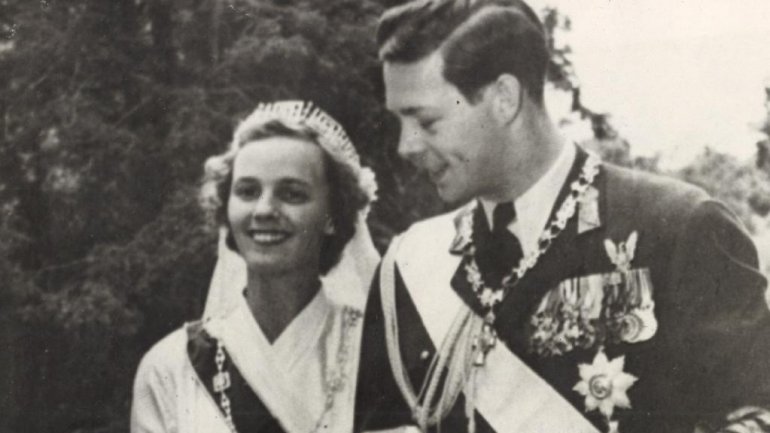Former King Michael's role in history: His decision shortened Second World War course
 foto: Princess Anne of Bourbon-Parma and ex-King Michael I of Romania on their wedding day in Athens in 1948./ dailytelegraph
foto: Princess Anne of Bourbon-Parma and ex-King Michael I of Romania on their wedding day in Athens in 1948./ dailytelegraph
The historical role of King Michael I of Romania is well-known. Historians believe that he has decisively influenced the course of the Second World War by his decision to remove Romania from its alliance with the powers of the Axis. It is known that this courageous decision has shortened the duration of the war by at least six months, writes realitatea.net.
As a consequence of His Majesty's act, during the peace talks that followed the war, Romania managed to recover Northern Transylvania, occupied in 1940 by Horthyist Hungary, even if Romania failed to obtain the status of cobeling power, nor to take back Bessarabia and North Bucovina, occupied by the Soviet Union, nor the Cadrilater, occupied by Bulgaria.
On August 23, 1944, King Michael ordered the Romanian Royal Army, who fought victoriously on the western front in Romania territories, Hungary, Slovakia and Austria. His Majesty commanded the Romanian Royal Army not only as a Romanian sovereign, but also as a holder of the marshal degree, the highest military degree, which he received on May 10, 1941, on the occasion of the National Day of Romania.
King Michael I was born on October 25, 1921, in Sinaia. His father was Prince Carol, and his mother was Queen Elena.
Their family history was extremely tumultuous, marked by controversies and amorous scandals. In 1925, Prince Carol gave up the throne for his mistress, Magda Lupescu, and, after King Ferdinand's death, Mihai became King Michael in six years.
Three years later, he was dethroned by his father who returned to Romania and became King Carol II, then on September 6, 1940, he fled the country, also for Elena Lupescu. Thus, at age 18, Mihai became king again, and his reign was marked by the return of weapons against Nazi Germany during the Second World War.
Later, young King Michael went to London to attend the wedding of Queen Elizabeth II. There he met Princess Ana, who was to become his wife.
On January 3, 1948, Mihai was exiled and remains abroad until the fall of the communist regime. In 1992, King Mihai's first visit to Romania took place, and in 1997 King Mihai received his Romanian citizenship back.
On October 25, 2011, King Mihai holds a historic speech in the Romanian Parliament, and in a few years, in March 2016, the representatives of the Royal House of Romania announced his illness and his withdrawal from public life.
As a consequence of His Majesty's act, during the peace talks that followed the war, Romania managed to recover Northern Transylvania, occupied in 1940 by Horthyist Hungary, even if Romania failed to obtain the status of cobeling power, nor to take back Bessarabia and North Bucovina, occupied by the Soviet Union, nor the Cadrilater, occupied by Bulgaria.
On August 23, 1944, King Michael ordered the Romanian Royal Army, who fought victoriously on the western front in Romania territories, Hungary, Slovakia and Austria. His Majesty commanded the Romanian Royal Army not only as a Romanian sovereign, but also as a holder of the marshal degree, the highest military degree, which he received on May 10, 1941, on the occasion of the National Day of Romania.
King Michael I was born on October 25, 1921, in Sinaia. His father was Prince Carol, and his mother was Queen Elena.
Their family history was extremely tumultuous, marked by controversies and amorous scandals. In 1925, Prince Carol gave up the throne for his mistress, Magda Lupescu, and, after King Ferdinand's death, Mihai became King Michael in six years.
Three years later, he was dethroned by his father who returned to Romania and became King Carol II, then on September 6, 1940, he fled the country, also for Elena Lupescu. Thus, at age 18, Mihai became king again, and his reign was marked by the return of weapons against Nazi Germany during the Second World War.
Later, young King Michael went to London to attend the wedding of Queen Elizabeth II. There he met Princess Ana, who was to become his wife.
On January 3, 1948, Mihai was exiled and remains abroad until the fall of the communist regime. In 1992, King Mihai's first visit to Romania took place, and in 1997 King Mihai received his Romanian citizenship back.
On October 25, 2011, King Mihai holds a historic speech in the Romanian Parliament, and in a few years, in March 2016, the representatives of the Royal House of Romania announced his illness and his withdrawal from public life.